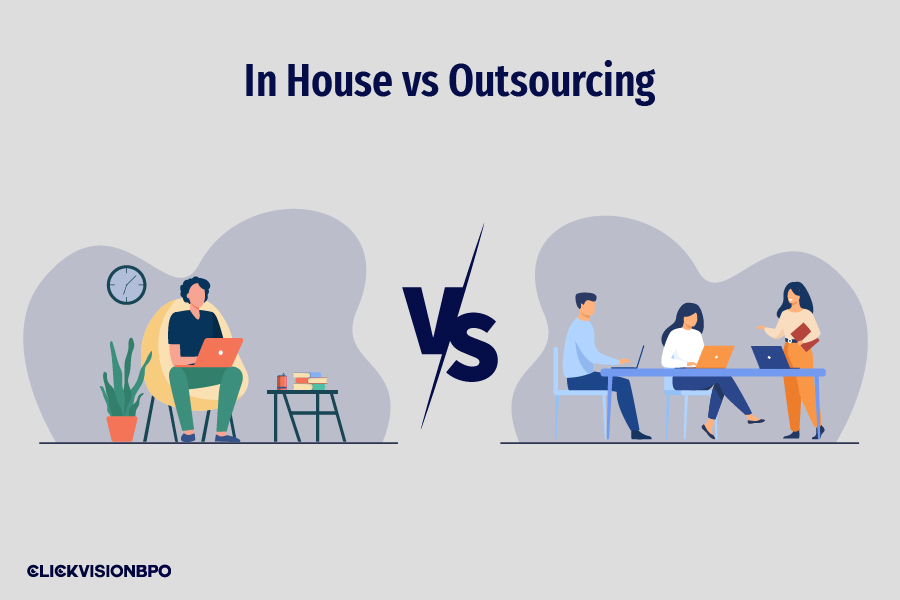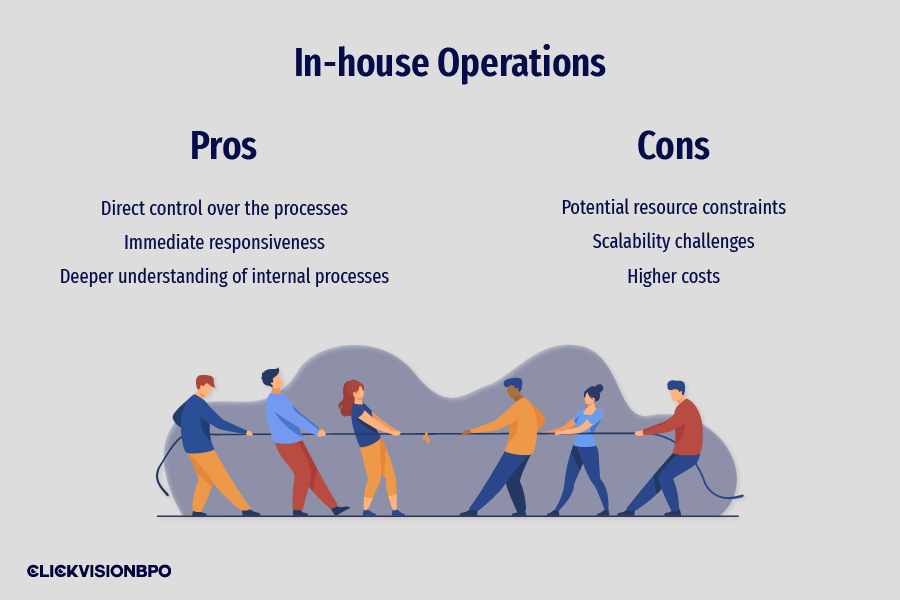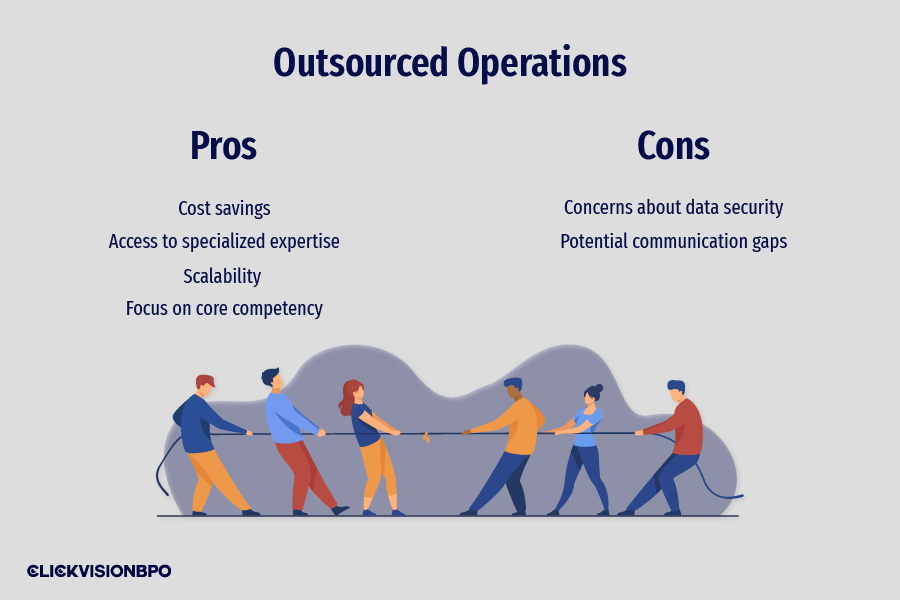Since the business landscape is constantly evolving, companies often face the dilemma of keeping their operations in-house or outsourcing them to external vendors. Both in house vs outsourcing operations come with advantages and drawbacks. So, which option to go for?
While in-house involves conducting operations or tasks within the company’s premises, outsourcing delegates specific tasks or processes to external service providers. In this post, we will dive into the pros and cons of both practices to help you make informed decisions and navigate the business landscape effectively.
In House vs Outsourcing Operations
Are you wondering whether to outsource specific tasks and projects to a third party or maintain them in-house? The decision you make can significantly influence your company’s daily operations, financial structure, and overall operational success.
Hence, it is necessary to take certain factors into consideration. In continuation, let’s explore the advantages and drawbacks of these practices. By understanding their nuances, you can make decisions that align with your business needs and goals.

Pros of in-house operations
In-house operation refers to the practice of handling specific tasks and projects within the company rather than relying on outsourcing. So, the initial company uses its own time, employees, and resources to finish the necessary tasks. Such an approach has become popular as it can provide many advantages for businesses.
Direct control over the processes
When you develop a project or tasks in-house, you have greater control of the business operations. You have the ability to set standards, implement changes, and ensure adherence to organizational objectives without external dependencies.
As a leader, this approach allows you to monitor the progress of projects and determine the outcomes. It enables you to internally manage your team and ensure the processes meet the quality standards and the company’s objectives.
With in-house operation, it is also easier to perform quality checks. With this approach, you can monitor every step of the project and ensure that you are delivering services or products that meet quality standards.
Immediate responsiveness
Immediate responsiveness is another crucial advantage of in-house business operations. Time is of the essence in the business landscape, and such an approach enables teams to tackle issues and promptly respond to changing market conditions.
They can quickly adapt to changes and prioritize tasks based on real-time needs. Such flexibility is essential in industries where decision-making, execution, and swift adaptation are crucial for success.
Deeper understanding of internal processes
Conducting operations in-house fosters a deeper understanding of internal processes and workflows. The employees develop specialized knowledge and expertise based on the company’s unique requirements.
By keeping operations in-house, your company can better understand its internal processes. The project team can clearly communicate with each other, fostering a culture of innovation and continuous improvement.
Due to their involvement in the daily tasks and objectives, the employees can better comprehend the business and the requirements of the tasks they work on. Such operations can enhance operation efficiency and organization.
Cons of in-house operations
Potential resource constraints
As we can see, in-house operations can provide many advantages. However, they also come with a set of challenges. Resource constraints pose a significant hurdle. This is particularly the case for smaller enterprises that operate in niche industries.
Allocating sufficient workforce, infrastructure, and technology investments to support diverse functions can limit scalability and strain the budget. Resource constraints, like limited workforce or expertise, may hinder the organization’s ability to effectively manage and execute tasks, especially during peak periods or specialized projects.
Scalability challenges
Scalability challenges exacerbate this issue as internal resources may be stretched thin when faced with sudden spikes in demand. Adjusting resources to meet the demands becomes critical as the business expands or contracts.
In-house operations may need help to scale efficiently, leading to missed growth opportunities. In addition, the burden of managing all aspects internally can lead to inefficiencies and administrative complexities. It can divert attention away from core business objectives.
Higher costs
Higher costs are a notable drawback associated with in-house operations. While it can lead to cost savings with time, this approach comes with upfront investments. Companies often need to allocate funds for hiring and training personnel. They may also need to invest in purchasing necessary resources, equipment, and technology and providing a suitable work environment.
An in-house operation and services often require increasing the budget. The reason is often to complete the task or meet the project’s demands in a timely manner. Also, specific projects may require hiring workers with special knowledge, training, skills, and credentials.
The need for specialized training can increase costs and lead to project delays. In addition, ongoing expenses like monthly salaries, benefits, and infrastructure maintenance contribute to the overall cost.

Pros of outsourced operations
Outsourcing is a business strategy that designates specific tasks, functions, or processes to third-party service providers. Hence, it can offer a spectrum of advantages that enhance operational efficiency and competitiveness.
Cost savings
One of the primary benefits of such an approach is cost-effectiveness. With outsourcing, your company can access the specialized expertise and resources of external partners and save on costs.
You can save on hiring, training, infrastructure, and overhead expenses. In fact, outsourcing commonly allows companies to access specialized expertise at a fraction of the cost in comparison to hiring and maintaining in-house teams.
Access to specialized expertise
Outsourcing enables businesses to tap into a large global pool of specialized talent and expertise. It allows companies to collaborate with partners that possess skills and resources they may need to improve internally. The outsourcing providers typically have extensive knowledge and access to the latest technology.
Therefore, outsourcing is valuable for businesses that need individuals with specialized expertise to complete specific jobs and projects. However, maintaining a dedicated in-house staff doesn’t seem like a practical option for them.
Our team at CLICKVISION BPO possesses niche skills and industry knowledge. We aim to enable companies to streamline operational processes and drive innovation.
With our knowledge, training, and skills, the entire process can run smoothly and efficiently, ensuring your projects meet your expectations. We are committed to delivering solutions tailored to your company’s requirements.
Scalability
Outsourcing offers flexibility in scaling operations based on the company’s needs. As the operational needs fluctuate, the external partners can adjust resources to match their demand. Such flexibility can be especially valuable for companies facing dynamic workloads or market conditions.
Focus on core competency
By outsourcing non-core services to external providers, companies can concentrate on their core activities. As a result, they can strengthen their capabilities and promote organizational effectiveness and expansion.
Cons of outsourced operations
Concerns about data security
While outsourcing provides numerous benefits, it also comes with challenges that should be taken into consideration. One of them is the concern about data security. This approach involves sharing sensitive data with external service providers.
Hence, the companies must carefully vet the outsourcing providers and implement robust data protection measures, including contractual terms. Doing so can mitigate risks connected to data breaches and unauthorized access.
Potential communication gaps
Effective communication is crucial for successful outsourcing. Yet, differences in time zones, communication styles, and cultural nuances can lead to misunderstandings and potential delays.
Maintaining effective communication can pose a challenge, particularly when dealing with offshore or remote teams. Hence, companies outsourcing must invest in communication tools, establish clear protocols, and foster open dialogue.
The reason is to overcome potential language and cultural barriers. Maintaining effective communication is essential to prevent potential communication gaps and coordination issues, which can impact project timelines.

Conclusion
The decision between in house vs. outsourcing operations is intricate and requires careful consideration of multiple factors. Both offer unique advantages and drawbacks; the ultimate choice depends on your needs, goals, and resources.
By carefully evaluating each approach and adopting a strategic mindset, your company can leverage suitable operations. That way, you can drive innovation, competitiveness, and growth in today’s dynamic marketplace.

With a strong background in the marketing industry and healthcare leadership roles, Filip is responsible for CLICKVISIONBPO’s sales strategies and onboarding new clients. With a passion for sharing insights gained from his experience, he also shares valuable knowledge through industry related articles.
